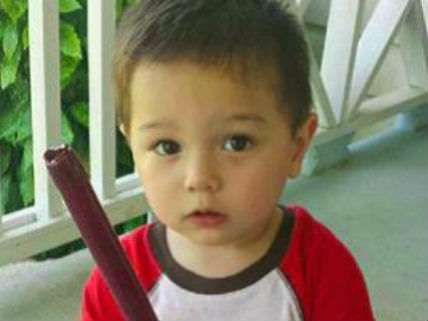'Bou Bou's Law' Would Restrict No-Knock Police Raids
A horribly injured toddler inspires legislation to rein in drug warriors.

In response to a botched drug raid that gravely injured a toddler last May, a Georgia state legislator has introduced a bill that would impose new restrictions on warrants that allow police to enter homes unannounced. Bou Bou's Law—which Sen. Vincent Fort (D-Atlanta) named for Bounkham "Bou Bou" Phonesavanh, the 19-month-old boy who was nearly killed by a flash-bang grenade tossed into his crib—would allow "no knock" warrants only in cases where the police can show "probable cause that if an officer were to knock and announce identity and purpose before entry, such act of knocking and announcing would likely pose a significant and imminent danger to human life or imminent danger of evidence being destroyed." That rule is stricter than the standard the Supreme Court has said is required by the Fourth Amendment: "reasonable suspicion" that knocking and announcing "would be dangerous or futile" or "would inhibit the effective investigation of the crime."
According to Carrie Mills, a retired Atlanta cop who "considers herself an expert on search warrants," the change proposed by Fort would be reckless. "If we knock and announced, all evidence is going to be destroyed," she told WTOC, the CBS station in Savannah. "You have to draw the line between your right as a citizen to privacy and a community's right to live in a crime-free environment. You can't have them both."
The Framers probably would have disagreed. In any event, the "crime" Mills has in mind consists of voluntary transactions involving arbitrarily proscribed intoxicants. If I have to choose between my privacy and vainly trying to stop people from getting high in ways that Carrie Mills does not like, that is a pretty easy choice.
The no-knock raid that injured Bou Bou, which was carried out by a Habersham County SWAT team, was aimed at his cousin, Wanis Thonetheva, a small-time meth dealer who no longer lived in the house where the boy was staying with his parents and sisters. It is certain that if people like Mills did not use violence to shut down such entrepreneurs, Bou Bou would not have been burned and mutilated by an errant "distraction device," he would not have to undergo a series of surgeries that will continue into adulthood, and his family would not be stuck with $1.6 million in medical expenses. That outcome also might have been avoided if police, who said they had no idea children were present in the home, had done even the most rudimentary surveillance before knocking down the door.
It is less clear to me that the rule imposed by Fort's bill would have saved Bou Bou and his family from all that suffering. For one thing, although no weapons (or drugs) were found in the house and Thonetheva was unarmed when he was arrested at a different location later that day, the cops claimed he was apt to be armed and dangerous, citing a history of gun charges. I'm not sure that would qualify as probable cause to believe that knocking and announcing would pose "a significant and imminent danger to human life," but it might.
Even if police had knocked and announced themselves before entering the house, it might not have made any difference. It was the middle of the night, and everyone in the house was asleep, so it seems unlikely they would have heard and understood the police, let alone that they would have had enough time to answer the door before it was knocked down. Police are supposed to wait a "reasonable time" after announcing themselves, but it is not clear what that means. According to a 2003 Supreme Court decision, the relevant question is not how long it takes to answer the door but how long it takes to flush the drugs. In that case, the Court said 15 to 20 seconds was plenty of time. For people awakened in the middle of the night, that is probably not enough.
Another Georgia bill, introduced by Rep. Kevin Tanner (R-Dawsonville), would raise the evidentiary standard for no-knock warrants and require that they be executed between 6 a.m. and 10 p.m. "unless the judge for good cause expressly authorizes execution at another time." That begins to address the safety issues raised by middle-of-the-night raids, which include the very real risk that cops will be be mistaken for burglars and shot. A similar timing expectation for all searches would help make the knock-and-announce rule more meaningful.


Show Comments (142)